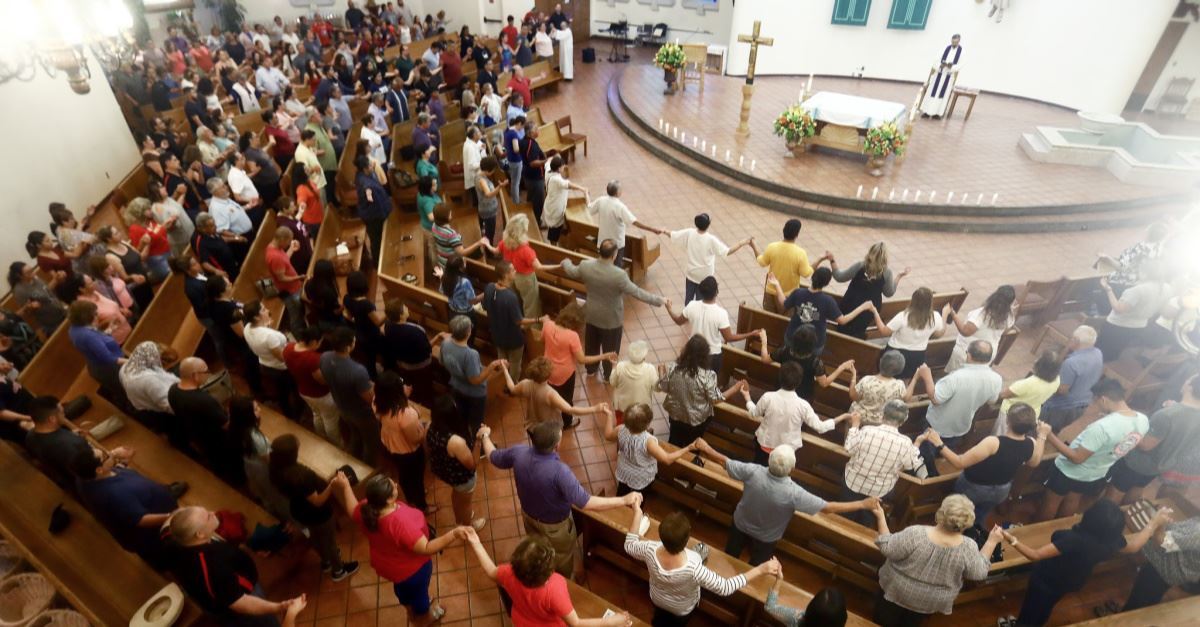Receiving Something You Don’t Deserve
If you have accepted Jesus’ gift of salvation, you have been saved by grace! But what exactly does that mean?Being saved by grace means that we have received a gift from God that we do not deserve. God gives us his favor, his love, his son…despite the fact that we have done nothing to earn it.
God sent his son to pay for our sins through his death on a cross…EVEN though we are sinners who have done nothing for God. God freely gives GRACE to us out of His love for us.
“But God demonstrates his own love for us in this: While we were still sinners, Christ died for us.” Romans 5:8
And now that we have received His Grace – we are made right with God. We can have a relationship with him. And we can look forward to eternal life in heaven with him.
Sometimes people refer to this acronym for Grace:
God’s
Riches
At
Christ’s
Expense
We are the recipients of all the goodness of God through Christ’s death.
This Amazing Grace has been sung about for years by millions of people.
Amazing Grace how sweet the sound that saved a wretch like me. I once was lost, but now am found, was blind, but now I see.
Why would God Give Us His Grace?
God knows we are sinners. He knows we mess up. He wants us to live obedient lives but knows that we will never be able to do that on our own. Even so, He still wants a relationship with us.So Jesus came to earth, lived a perfect life, and died a sacrificial death on a cross. All we need to do is believe that is the truth and we will be “washed clean” by Jesus’ blood. When God, the Father, looks at anyone who believes in Jesus, His son, He sees them as forgiven and pure, and they can be in relationship with Him.
What does grace look like?
Picture this: You are standing before a judge who has a huge list of all the crimes you have committed that are punishable by death. However, there is someone in the crowd who promises to take your punishment of death, and you will be given their clean slate. That results in getting something you don’t deserve. And that is what Jesus did for you. But just as you would need to ACCEPT the clean slate in court which you didn’t earn, you need to believe in and receive this same gift from Jesus.Accepting God’s gift of grace is the best decision you can ever make!
Jesus! What a Beautiful Name!
One more song for you today. It’s all about the beautiful name of Jesus because he made a way for us to be in relationship with God. As the song says:You didn’t want heaven without us
So Jesus, You brought heaven down
My sin was great, Your love was greater
What could separate us now.
Click here to donate as The Spirit leads you to support the vision of this mission and the orphange for God loves a cheerful giver - Ah Lord God! behold, thou hast made the heaven and the earth by thy great power and stretched out arm, and there is nothing too hard for thee: -Jeremiah 32:17
To be saved by grace means to be delivered from the righteous judgment of God through no act of your own but by His unmerited favor. God gave us the law (Exodus 20:1-17). The law is comprised of what we should and should not do regarding loving God and loving man (Matthew 22:37-40). However, to break the law of God is to sin (1 John 3:4). Unfortunately, we have all sinned against God (Romans 3:23), so we all deserve to be judged by God according to the Law. The Bible tells us that the wages of sin is death (Romans 6:23) and separation from him (Isaiah 59:2). So, we are all under the righteous judgment of God. Because we are sinners, we are by nature children of wrath (Ephesians 2:3).
Grace, on the other hand, is unmerited favor. Let me illustrate with three scenarios.
- First, let's say that I go over to your house and I steal your bike. You catch me and I go to jail. That is justice. I got what I deserved.
- Second, I go to your house and steal your bike. You catch me but set me free. That is mercy. I did not get what I deserved.
- Third, I go to your house and steal your bike. You catch me, but you not only set me free, you give me the bike. I got what I did not deserve. So, in justice, we get what we deserve. In mercy, we don't get what we deserve. In grace, we get what we do not deserve.
So, to be saved by grace means that the judgment due to us because of our sin against God, i.e. lying, stealing, adultery, fornication, coveting, lust, etc., will not befall us; that is forgiveness. But in addition, we get what we do not deserve, being in the presence of God.
Finally, the only way to be saved by grace is by putting your trust in what Jesus did on the cross. He never sinned (1 Peter 2:22) and he bore our sin in his body (1 Peter 2:24). He paid the price. He satisfied the penalty of the law by dying on the cross (1 Corinthians 15:1-4). Because our righteous deeds are filthy rags before God (Isaiah 64:6), then we have nothing that is pure to offer God (Deuteronomy 17:1; Romans 3:10-12). Therefore, the only thing left for us to do is to trust what Christ has done on the cross, by faith. That is why the Bible tells us that we are made right before God by faith (Romans 5:1). Therefore, to be saved by grace means to be safe from the righteous judgment of God by the unmerited favor found only in the work of Jesus Christ on the cross.
Amazing grace—how sweet the sound—
That saved a wretch like me!
I once was lost but now am found,
Was blind but now I see.
The words of this famous hymn by John Newton seem to resonate with people of all theological persuasions: it is performed in churches of all kinds, from evangelical Christian, to Roman Catholic, to mainline liberal, to Mormon. It has been recorded by countless artists from Johnny Cash and Elvis Presley, to the Three Tenors, to Rascal Flatts and Alan Jackson. The concept of (or at least the word) grace is firmly planted in our culture.
The concept of grace as found in the Bible is multifaceted, but it can be summed up in the definition “undeserved favor.” The Bible says that we are saved by grace. The grace of God is expressed by God’s forgiveness of our sins, and His blessings to us include peace and fulfillment in this life and, in the life to come, unencumbered fellowship with Him for all eternity. Just as the song “Amazing Grace” has gained almost universal acceptance, it is difficult to find any religious expression with roots in Christianity that does not extoll the virtues of grace. No one with even minimal exposure to Christianity would be so crass as to claim that he has lived a life of such sterling character that God owes him eternal life. The vast majority will admit that they have shortcomings and are in need of God’s grace in some form.
However, there is much misunderstanding about being saved by grace. A great many who call themselves Christians assume that the grace of God has established a system whereby the sinner can mitigate his deserved punishment by his own efforts. For some this may be a formal system of sacraments that infuse the soul with the grace of God. For others the system is less formal but still includes various religious activities, such as church attendance, baptism, contributing to the offering, and doing good deeds. While most agree that “nobody’s perfect,” many say that God in His “grace” will overlook our sins if He sees that we have made a genuine effort to do the right thing, mend our ways, and avail ourselves of the help He offers through the church—if He sees that the trajectory of our lives is headed in the right direction, then in His “grace” He will forgive our sins and grant us eternal life. In this view of “grace,” the sinner does not earn eternal life in an absolute sense, but his penitent response and genuine effort does trigger a gracious response from the Father. This belief, although widespread, contradicts the true meaning of grace (“unmerited favor”).
This example may help illustrate the above view of grace: a teenager works hard all summer to save money to buy a car. He works a regular job and does yard work and odd jobs on the side. He saves his money and does not spend it frivolously. Nevertheless, at the end of the summer, he simply does not have enough money to buy a car that will meet his needs. His father, seeing his diligence and frugality, graciously steps in and not only makes up the difference but also adds more money to the car fund so that his son can buy a car that is better than he thought he could ever afford. The son’s best effort was not good enough, but the father’s grace makes up the difference. No one would claim that the father was obligated to make up the difference, so, when he does, it is an act of grace. If the son had been fired from his job for showing up late, had lazed around at the pool every day instead of working, or had spent what money he had on fast food and video games, then the father would not have stepped in to make up the difference. It would be incorrect to say that the son “earned” the car, for he did not, but his effort did trigger a gracious response from his father.
According to the Bible, is this really grace? The answer is NO! Grace is undeserved favor; it is God’s blessing on the unworthy. In the example above, the father bestowed his favor because he felt his son’s efforts should be rewarded—the father’s gift was based on a genuine effort by the son and was therefore not true grace. Jesus illustrated true grace with the story of a father who received his runaway son with celebratory joy—a totally unworthy individual who brought nothing to his father except dishonor and shame was lavished with undeserved blessings (Luke 15:11–24).
We are saved by grace, not by a mixture of God’s grace and our meritorious works. According to Scripture, we can do nothing to earn salvation, nor are our best efforts good enough to elicit a gracious response from God so that He will make up the difference. All of our righteous deeds are as filthy rags (Isaiah 64:6). Even considering our best efforts, we have fallen short of God’s standard of righteousness (Romans 3:23), and we deserve death (Romans 6:23). We are not commanded to “do our best” for God but to love Him perfectly and completely (Matthew 22:37). We fail in that. The command is not to “try” to love our neighbors but to actually succeed in loving our neighbors as we love ourselves (Matthew 22:39). In spite of our “best efforts,” we fail—and who can honestly claim they gave it their “best effort” anyway?
People will often try to comfort those who realize their shortcomings by saying something like “Don’t be afraid—God knows your heart,” as if that should be a comfort. If God knows our hearts, we are doomed indeed—there is no place left to hide! Our only hope is to place our faith in Jesus Christ who lived a perfect life, died on the cross to pay for our sins, and rose again. Our sin is imputed to Him, and His righteousness is imputed to us when we trust Him (2 Corinthians 5:21). We are justified not by our works (Romans 3:20) but by Jesus’ resurrection (Romans 4:25). Faith itself is not a “good work” that causes God to take notice of us. Faith is repenting of our sin, admitting that we are hopelessly and helplessly lost and unable to do anything to gain God’s favor, then simply accepting the salvation that He offers freely.
We are saved by grace; the work is God’s, not ours. “Now to the one who works, wages are not credited as a gift but as an obligation. However, to the one who does not work but trusts God who justifies the ungodly, their faith is credited as righteousness” (Romans 4:4–5). Here we see two great truths. First, God justifies the ungodly—not people who have done their best and somehow elicited a gracious response from God. God justifies those who do not deserve it. Second, God justifies people who receive salvation by faith—not people who give it their best effort. If they are justified in any part based on what they do, they are receiving wages, not a gift. If grace is based on works to any degree, then it is not grace (Romans 11:6).
We are saved by grace from beginning to end. Once a person has come to faith in Christ, he will undoubtedly realize that the only reason he was able to have faith is that God was drawing him even before he knew it (see John 6:44). Left to himself, the sinner would have continued to rebel and flee from God. Even before we believe, the very desire to come to God is God’s grace at work to save us. “Salvation belongs to the LORD” (Psalm 3:8, ESV; cf. Revelation 7:10).
Salvation by grace means that, from first to last, it is undeserved. Jesus is the Author and Finisher of our faith (Hebrews 12:2). Grace is not God doing 95 or even 99.9 percent, with us making up the difference. Grace is God doing 100 percent and our humble acceptance of it, recognizing that we are unworthy and have nothing to contribute.
Could my tears forever flow,
Could my zeal no languor know,
These for sin could not atone—
Thou must save, and Thou alone:
In my hand no price I bring,
Simply to Thy cross I cling.
(Augustus Toplady)

















 PHOTO:
A Barnstable Police cruiser sits at the top of Marchant Avenue as
police investigate the death of Saoirse Kennedy Hill, the granddaughter
of the late Robert F. Kennedy, at the Kennedy Compound in Hyannis Port,
Mass., Aug. 1, 2019. (Faith Ninivaggi/Reuters)
PHOTO:
A Barnstable Police cruiser sits at the top of Marchant Avenue as
police investigate the death of Saoirse Kennedy Hill, the granddaughter
of the late Robert F. Kennedy, at the Kennedy Compound in Hyannis Port,
Mass., Aug. 1, 2019. (Faith Ninivaggi/Reuters) PHOTO:
People walk down the dock at the Hyannis Port Yacht Club by the Kennedy
Compound where police are investigating the death of Saoirse Kennedy
Hill, the granddaughter of the late Robert F. Kennedy, in Hyannis Port,
Mass., Aug. 1, 2019. (Faith Ninivaggi/Reuters)
PHOTO:
People walk down the dock at the Hyannis Port Yacht Club by the Kennedy
Compound where police are investigating the death of Saoirse Kennedy
Hill, the granddaughter of the late Robert F. Kennedy, in Hyannis Port,
Mass., Aug. 1, 2019. (Faith Ninivaggi/Reuters) PHOTO: An aerial view of the Kennedy Compound, July 25, 2008, in Hyannisport, Mass. (Tim Gray/Getty Images)
PHOTO: An aerial view of the Kennedy Compound, July 25, 2008, in Hyannisport, Mass. (Tim Gray/Getty Images)